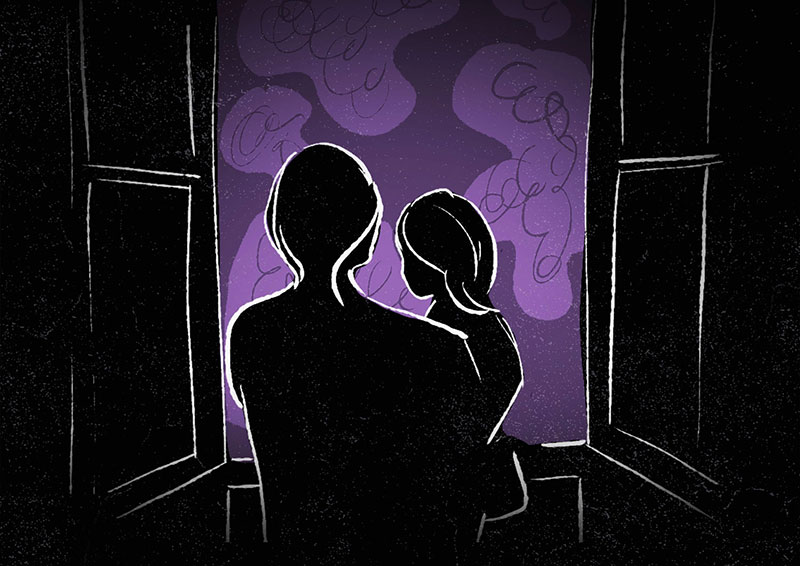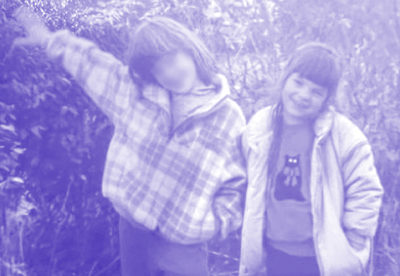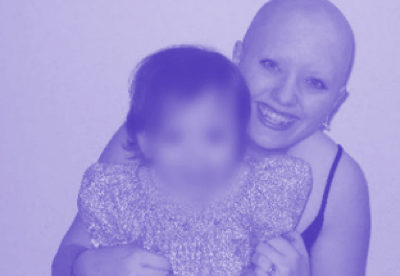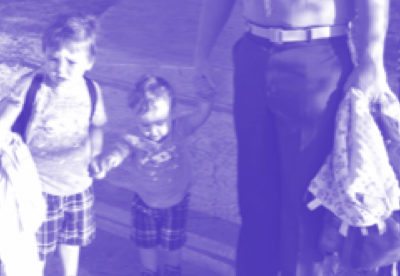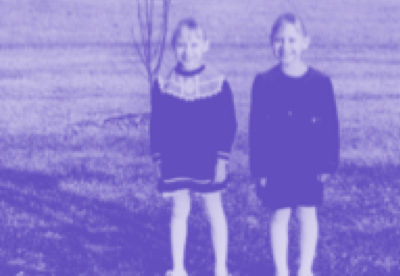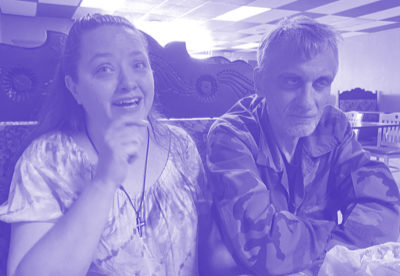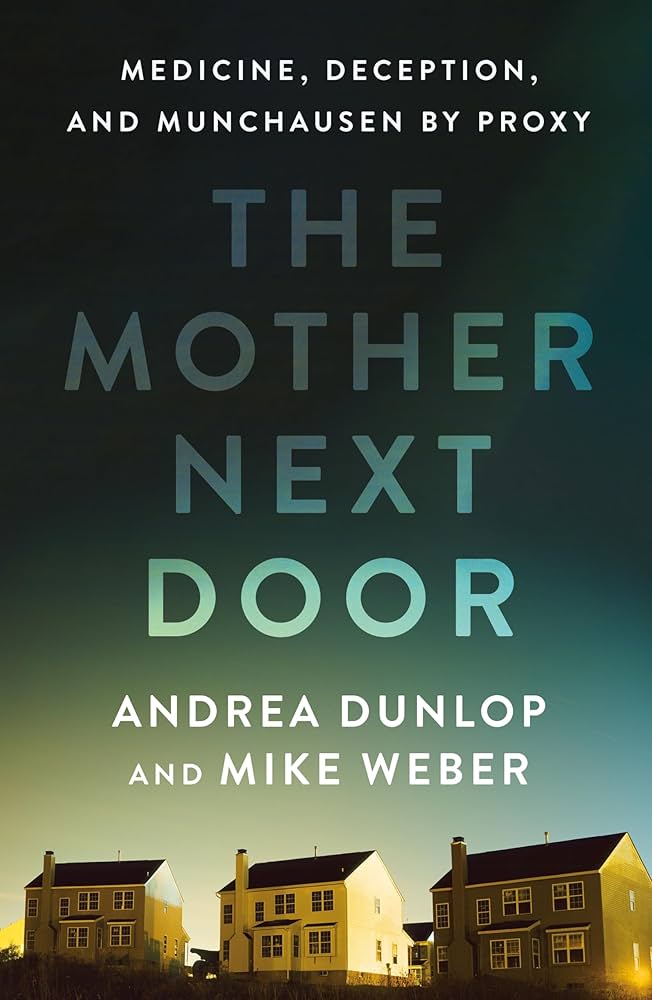SEASON 02 | EPISODE 01
Blunt Force Instrument
Meet Andrea Dunlop, accomplished novelist and mother, as she embarks on a journey to understand the series of events that tore her family apart.
In the first episode, we learn how Andrea first became captivated by the story of Hope Ybarra–who spent ten years in prison for Munchausen by Proxy–and begin to unpack Hope’s case and the many similarities to Andrea’s own family story.
Andrea introduces us to Hope’s father, sister, and brother: the first people Andrea has spoken to outside her family who understand what she’s been through. But can anything prepare Andrea for the truth?
Host Andrea Dunlop:
https://www.andreadunlop.net
For behind-the-scenes photos:
https://www.instagram.com/andreadunlop/
Support the show and get exclusive bonus content:
https://patreon.com/NobodyShouldBelieveMe
For information and resources:
https://www.munchausensupport.com
The American Professional Society on the Abuse of Children’s MBP Practice Guidelines can be downloaded here.
More about Dr. Marc Feldman:
https://munchausen.com
Andrea: Nobody should believe me is a production of large media. That’s L A R J Media. Before we begin a quick warning that in this show we discuss child abuse and this content may be difficult for some listeners. If you or anyone you know is a victim or survivor of medical child abuse, please go to munchhausen’s support.com to connect with professionals who can help.
Andrea: People believe their eyes. That’s something that actually is so central to this whole issue and to people that experience this, is that we do believe the people that we love when they’re telling us something. I’m Andrea Dunlap. And this is, nobody should Believe me. I am a novelist. I’m the author of four books.
Andrea: Most recently Women are the Fiercest Creatures, which came out this past March. My third book we came here to Forget, which came out in the summer of 2018, was inspired by my family’s story and my experience with Muncha by Proxy, which is what started me off on this [00:01:00] whole journey. Oh, loves climbing up a mommy.
Andrea: I am a mom of two beautiful children. I actually had my second baby, my son column between making seasons one and two of this podcast. Oh, I got a little monkey on my back. I got a monkey on my back. Careful loves. Oh. If you listen to season one of this show, thank you. We received so many kind reviews that helped people find the show and just have felt so much support.
Andrea: If you haven’t already listened to season one, I highly recommend that you go back and listen to it before diving into season two. You can listen to all eight episodes plus some fantastic bonus content wherever you listen to podcasts. A note about this season, we are going to be offering all of the episodes early and ad free on both.
Andrea: Patreon and Apple Plus, and you can listen to the first three episodes on those platforms right now. So please go to patreon.com/nobody should [00:02:00] believe me or Apple Plus. And we will leave both of those links in the show notes.
Andrea: Health isn’t something you can lie about to anyone. Why should we support abuse? We shouldn’t. It’s something that we shouldn’t support. I know what it’s like to be lied about. My health, Brittany, my biological mother, abused me for three years. I remember being told to act like I was sicker and healthy.
Andrea: Why shouldn’t we save people? Why shouldn’t we save kids?
Andrea: What you heard up top was audio from an extraordinary girl called Alyssa, who is testifying in front of the Texas state legislature in support of a bill that is named after her that would protect children from medical child abuse. Alyssa is bright and resilient, and she is a survivor of horrific abuse that was perpetrated on her [00:03:00] by her mother, Britney Phillips.
Andrea: Their case is going to be the central focus of our season, and it is in some ways. Similar to the cases we talked about last season. We are gonna be staying in Tarrant County. So you will hear a very familiar voice from season one that of Detective Mike Webber. But there are some really shocking twists and Britney is an entirely different kind of offender than hope Ybarra
Detective Mike: it’s different in a lot of ways. Um, I think the main area that it’s different is Hope was a manipulator. Britney was too, but Britney was also very forceful and did not have near the charisma that hope Ybarra hat, which is why she was called earlier. Britney didn’t have the charming personality that hope YouBar a hat.
Detective Mike: Britney was very blunt, very to the point, and when she didn’t get what she wanted, uh, she was hard to handle. She would fly off the handle very quickly.
Andrea: It really struck me when I first read about the Britney Phillips case, because [00:04:00] I had really developed a preconception about what these offenders were like.
Andrea: That I think is common among people that have heard of this at all, which is that in order to pull this. Off to pull the wool over the eyes of doctors and your community, et cetera, and to sort of get away with it. You have to be very smart, very sort of cunning and this kind of master manipulator. To me, Britney doesn’t seem to fit.
Andrea: Those criteria in the same way. Did that strike you when you were first getting involved in the case?
Detective Mike: I mean, it’s always easier to see these things in hindsight than it is in, in, in foresight. She was not as polished as an offender, as hope you borrow at all. She was very much a blunt force instrument, um, when it came to medical professionals.
Detective Mike: But at the same time, people need to realize medical professionals. Are not trained in this abuse. They know as [00:05:00] much about this abuse as a common person on the street. They don’t receive training in medical school for this. They’re actually taught to trust the mother, to trust the caregiver and the history that they provide.
Detective Mike: So they’re even coming into it even less prepared than a regular citizen would be.
Andrea: Right? Be And that’s sort of what enables them to be able to do their jobs that credulity. 99 times out of a hundred is not misplaced. Right. Right.
Detective Mike: Correct. Yeah. I mean, we’re, we’re talking while this is more prevalent than the media reports and than people think it’s, this is not every mother.
Detective Mike: Right. Right. I mean, this is a very, very, uh, Uh, small percentage of mothers that do this. So, and doctors rely on that history. I mean, it’s the most important aspect to a medical diagnosis. And I think what Britney demonstrates is this is not hard to commit someone of average intelligence who’s just of a blunt force to the doctors yells and screams when she doesn’t get her way, can do this.
Detective Mike: [00:06:00] And she’s a perfect demonstration of that. Yeah. And could be a very advanced defender, also
Andrea: looking at the hope you borrow a case. You know, these two cases are striking for really different reasons. You know, Hope’s case was shocking because she really had her whole family, her whole community, you know, in her church and in the Cook’s, children’s Parents council and like she had all of these places in the community where she was.
Andrea: So Beloved and where she really was being looked at as this amazing sort of supermom, and that was what a lot of people thought about her. And then to find out that in fact it’s all lies is very shocking. And for Britney’s case, you know, things played out really differently in the lead up to the investigation, right?
Andrea: I mean, it strikes me reading through the files that. Everyone in Britney’s life seemed to understand that there was a problem. They might not have been able to say exactly [00:07:00] what it was or put their finger on that.
It was medical child abuse. But you know, hope really had people fooled. She was presenting one face to the world that was not real.
Andrea: Britney does not seem to have that same power to sort of convince people that she was this amazing mother. It really seemed like a lot of the people in her life were worried about. Her as a parent.
Detective Mike: Correct. We get back to the education on this. While they were worried, even Laura Wayburn, who was a former C P S worker, while she was worried, no one really has a grasp of what this
Andrea: is just a note here that CPS p s stands for Child Protective Services in Texas.
Detective Mike: We don’t educate our CPS p s. Investigators, they receive no training on this. They have no policies on this. They have no findings. There’s not a medical child abuse finding in cps.
Andrea: There’s like not a box you can check literally on the cps.
Detective Mike: There’s literally not. And so it, it, it puts them in a, in, in a very difficult situation.
Detective Mike: So for someone who is a, just a blunt force instrument like Britney, it’s still easy to [00:08:00] do this. I mean, this is the easiest form of child abuse to commit and get away with, at least in my state.
Andrea: By the time Alyssa Phillips was three years old, she had been to the emergency room or urgent care more than 30 times.
Andrea: She had been to see different specialists 23 times, and she had had more than a dozen different kinds of radiology exams, including MRIs. These cases are always characterized by. A mother who takes her child to the doctor constantly. And you’ll recognize that pattern from some of the cases that we talked about in Season one, and in particular the Hope Ibarra case, who took her daughter to the hospital all of the time.
Andrea: But these two offenders are really, really different. You will. No. If you listen to season one, we spent some time with Hope Ybarra. She was the kind of offender that I thought was always in these cases, meaning that she was very smart. She was [00:09:00] charming. You could see how she persuaded people to believe her.
Andrea: You could see how she got people on her side. She was my baby girl, and I have. So much regret for hurting her. I love my family, especially my children, more than anything on this planet. Regardless of what I’ve done and the choices that I’ve made. Even I, when I was actually sitting with her, knowing everything that she had done, still found her to be in the moment sympathetic.
Andrea: And it took me a few minutes after I left that cafe to really regain my bearings. By all accounts, Britney Phillips, Alyssa’s mother was nothing like this. Mike refers to her as a blunt force instrument, which I think is really apt because by all accounts of everyone who knew her, she was just. A bully.
Andrea: She did not have the charm. She did not have the cunning. She did not seemingly did not have the intelligence to create [00:10:00] some really intricate con the way that Hope Ybarra did, but it just shows that it’s actually not that hard to pull this off. One of the things that was really striking about Hope’s story is that her entire family was very convinced about everything she was saying about her health and her daughter.
Andrea: This was not the case with those who were around Britney, and we spoke to two of her distant relatives, bill and Laura Waburn, who are going to play a big part in this story. I wanted to talk to them about their connection with Britney. So Britney Phillips is in fact an extended family member, is that right?
Andrea: That is correct. Can you remind me what the. Connection is,
Sheriff Bill Waybourn: well, for my brother, who’s the oldest of my family, married into the Phillips family, and his wife’s brother is the father of Britney Phillips. [00:11:00] Okay. If
Andrea: that makes it clear. I asked Laura Wayburn the same question.
Laura Waybourn: It’s a family tree with lots of branches.
Laura Waybourn: So Bill, my husband is, he’s got a brother. Whose wife is Alyssa’s Biological Great-aunt.
Andrea: That’s Patricia
Laura Waybourn: Wayburn? Yes. Okay. Mm-hmm. But we had known Alyssa. We had met with her, we had seen her. We had been to my brother-in-
law’s house for family gatherings and had been around her several times before that.
Andrea: I’ve spent a lot of time in Fort Worth now, and this seems very indicative of the place that they were this. Big extended family who had lots of get togethers, a lot of these people in this family had a lot of kids. And what this meant was that there were a lot of eyes on Britney and Alyssa and people started to notice that things didn’t seem quite right.
Sheriff Bill Waybourn: Well, I noticed, and now I’m gonna preface that with uh, some lay terms. I wasn’t looking for the things that maybe [00:12:00] Laura was looking at, or even Faith Ann, as I know you’re gonna talk to, was looking at as moms good mamas, Is that I did see that, that when, uh, when Brittany was at family gatherings. She would be absolutely talking about different illnesses and doctor experiences with the baby and what was going on, and, and that would be the majority of it because there would always be something, you know, trying to describe this as a fragile child.
Sheriff Bill Waybourn: And, and, uh, I remember specifically her wearing braces, leg braces at one gathering and, and her running. And I’m thinking, That’s interesting that she can run and, and those kind of things. I remember just previous to even, uh, uh, uh, the final straw that broke the cames back where they removed her just weeks prior to that, we were at a family gathering and, uh, she was still in diapers at little over three and, and that she was in a pool and, and.[00:13:00]
Sheriff Bill Waybourn: And Brittany was keeping her from eating because she says she couldn’t eat regular fruit because of digestive issues. And, uh, And those kind of things, but those are the kind of things that I remember. I remember her just trying to absolutely bring attention to herself. Absolutely. This is the most critical thing in the room.
Sheriff Bill Waybourn: And if she was there, that would be the domination of the. Conversation.
Andrea: Bill’s wife, Laura, noticed the same pattern
Laura Waybourn: every time we had seen her. At my brother-in-law’s, Alyssa would be playing and eating and having fun. And Brittany always, always talked about how she couldn’t eat, you know? And then you sit there and you see her eating.
Laura Waybourn: She can’t hardly walk. She’s walking. She always, always commented about how small she was, always talked about her medical conditions all the time. It was. Absolutely nonstop. There wouldn’t be a single person who wouldn’t have noticed how [00:14:00] outrageously strange it was, how she, how she was with Alyssa.
Andrea: Can you elaborate a little bit on that?
Andrea: Like was it just the, like Britney in conversation was extremely fixated on Alyssa’s medical
Laura Waybourn: Yes. Issues in conversations. She would try to drag anybody who would listen. And in. And if you know somebody wasn’t paying attention, she’d go to somebody else and try to drag them into a conversation about something that’s wrong with Alyssa or all of her medical appointments, or the doctors say this or the doctors say that.
Laura Waybourn: And she did it with me up until this happened, and then she stopped because she figured out I was on her. There was a time where she had brought. These leg braces for Alyssa. And she talked about how she has to have them, she’s supposed to have them on all the time. And I asked her then why doesn’t she have ’em on now?
Laura Waybourn: And she gave me some kind of story about, well, she’s asleep, blah, blah, blah. And I said, well, you know, you need to put ’em on if she’s supposed to have ’em on. And so she did. And then she was talking, uh, more so about a C P S case that she had. She was
Andrea: talking about a CPS [00:15:00] PS investigation into her
Laura Waybourn: Yes.
Laura Waybourn: About a c ps investigation into her where she was actually complaining to me about how the CPS p s case worker was not helping her get housing. She was really mad that they weren’t calling her back and helping her with her, um, financial
Andrea: situation, but at this time, it wasn’t anything regarding medical child abuse that she was being investigated for.
Andrea: She did
Laura Waybourn: mention that they were looking at how small she was, and I said, this is the point where she, she stopped talking to me, is I said, have they ever mentioned failure to thrive? And she said, oh, yeah, yeah. But it’s not the kind that I did. Um,
Andrea: it’s not the kind that I did. It’s not the kind that I did.
Andrea: She meaning, meaning
Laura Waybourn: what? Well, she’s, she’s basically saying, She knows that I know that there’s organic failure to thrive and inorganic failure to thrive, and she’s saying, oh no, I didn’t starve her. That’s, that’s what
Andrea: it meant. So she’s sort of like responding to an accusation that you did not make. [00:16:00] Yes.
Andrea: Essentially yes. Just saying like, yes, I’ve heard a failure to thrive, but I’m not starving her.
Laura Waybourn: Yes. And so then I, I probed just a teeny bit further and she stopped because, you know, there was, there was nowhere she could go at that point because, She was kind of out of the story.
Andrea: These kind of interactions were really alarming to the way Burns and Laura, who was actually a former CPS worker herself, was particularly alarmed by these comments about failure to thrive.
Andrea: So failure to thrive is a catchall term that they use for babies in small children who are not gaining weight the way they should. Now, Alyssa, like. Many children in these cases was born premature, but by this time she’s a toddler and most preemies eating issues have cleared up by this point. So this really stuck out to them.
Andrea: You’ve heard Bill and Laura mention Bill’s niece [00:17:00] Faith, who is Britney’s cousin, and she was one of the first people to really raise the red flag that something wasn’t right.
Faith: So like one time at, uh, I believe it was Easter, we were having an Easter dinner. She was there. And Alyssa was walking around to the tables.
Faith: Cause we had several tables set up with everybody eating, and she just wanted food. You could tell she was really tiny and she was hungry and she just
was trying to get everybody to feed her. So I just finally picked her up in my lap and started feeding her because it was obvious to me that she was starving and like her mom was not trying to give her any food.
Faith: And Brittany would say things like, she has trouble swallowing. But then she would give Alyssa food. But only small amounts. And then she would say, you can’t have anymore because it’s gonna make your stomach hurt and take it away. And Alyssa would still be crying wanting more food.
Andrea: That’s really heartbreaking to picture.
Andrea: So it sounds like before the investigation started, you had some concerns about the two of them together?
Faith: Yes. I actually told Laura [00:18:00] after seeing Brittany and Alyssa once I said, She has lunch. Has I told Laura that, I said, absolutely she has it, and I don’t know what to do. I was like, I know that she’s making this child sick.
Faith: I know that she’s hurt. I’m, I know that she’s hurting her, she’s making her sick, and she’s causing all of these issues. I mean, I had five children, so like I could tell there wasn’t really the things wrong that she was saying, like, Alyssa was a healthy child other than what she was inflicting on her.
Faith: Like she just wasn’t this sickly child like Britney was making her out to be. She would run and play and you know, all the things with all the kids and, but then yet she has all these medical issues. Like I just knew, I just felt incensed and I, I told my parents and I told Laura, I said, she has lunch housing.
Faith: Like what do we do? Like something is terribly wrong. She is hurting this child and I don’t know what to do. And I knew that she had already been like investigated by cps p s and I guess [00:19:00] nothing had come of that really. And so it was just like, what do you do? How do you go to anybody and say to them like, oh this, this girl’s got MUN child and I know she does.
Faith: Like, I mean, who’s gonna believe you? Really,
Andrea: this sense that you’re not gonna be believed if you bring these suspicions forward is something that I deeply relate with because you have to get past your own resistance to the idea that a mother could do this to their child, and then you know you’re gonna face that and.
Andrea: Resistance in other people, even though it is absolutely the right thing to do to report to both cps, PS and the police, if you have suspicions that a child is being abused, it’s really hard to do and I understand that no one wants to make that kind of call on a family member. Even Laura Wayburn, who is a very tough cookie, and a former C P s worker herself, had trouble with the idea of reporting.
Laura Waybourn: I had been [00:20:00] concerned. About her all this time. But you know, I hadn’t ever seen anything that was actually reportable. Um, just you, you can’t call and report this person’s weird cuz you know, you have to have some kind of specific allegation. And I think at that time there were several times that Faith and I discussed it, but I think at that time she had.
Laura Waybourn: Read a book or seen a movie or whatever and heard of Munchhausen syndrome by proxy, and I was like, well, yeah, I mean, definitely you know ho and you know, we were talking about, well hopefully they’ll. You know, obviously she’s, you know, being seen by somebody and, and just hoping that, you know, the system would help her.
Andrea: So within the family, what was the take on Brittany and Alyssa? Like, it sounds like you and Faith had some pretty explicit conversations about Yes. Possibility of it being an abusive relationship. Yes.
Laura Waybourn: Within the family, anybody who had. Really been around her, knew that people that didn’t understand child abuse even [00:21:00] just knew something was up.
Laura Waybourn: They knew something weird was going on. They. Most of them probably didn’t have any idea what medical child abuse is or how it works or, or how absolutely heinous it is. And just like the rest of the world, they just, they just don’t know. They just, it was, there’s not anybody who had been around Britney who wouldn’t have.
Laura Waybourn: Sensed that she was different.
Andrea: So something felt off, but people kind of couldn’t put their finger on it. Yeah, I mean,
Laura Waybourn: I, I would say that probably a lot of people just thought she was nuts or that, you know, she just talks a lot or she’s irritating or she’s, you know, just kind of overwhelmingly over the top everything.
Andrea: It wasn’t just Britney’s family who was concerned about her behavior. One of the striking things about this case is it was every single person who met her seemed to share these same concerns. And Britney’s online life plays a big part. In this case, [00:22:00] she was active on Facebook groups and you know, in these groups for new moms.
Andrea: And you know, we talked to Dr. Kaufman in the first season about how. Social media and online life has really made these cases explode, and this plays a big part in this story. So we spoke to one of those online friends of Brittany’s.
Heather Harris: My name is Heather Harris. I’m a registered nurse.
Andrea: How did you and Brittany originally meet?
Heather Harris: We had kids that were born around the same month cuz the what to expect.com website. Had it set up where your due date for that month and everybody that was due that month would get together and talk. And I have a child that was born in 2008, so that’s how we met. She had a child that was due the same time.
Heather Harris: So we met on the website.
Andrea: What do you remember about. Sort of your first interactions with her?
Heather Harris: They were okay. It was just like everybody else on the website and we had children that were all gonna be about the same age. So we talked, you know, about kid things and diapers and pregnancy and, and nothing seemed out of the [00:23:00] ordinary.
Andrea: Yeah. So just mom chat. Mm-hmm.
Heather Harris: It was a nice place to be able to go and meet people and that were gonna have kids your same age. And some people had older kids, or multiples of older kids, so you could get advice from ’em. So it was very nice. Yeah.
Andrea: Kind of like your mom village. Yes. Online if you’ll, yeah.
Andrea: Which is really important, right?
Heather Harris: Yeah. And then we discovered that a lot of us lived in the same area, so we could get and meet for meet and greets and got to know each other. A little bit better through that.
Andrea: When did you first meet, like how did you take that relationship into the real world? When did you first meet her in person?
Heather Harris: I found multiple other mothers in the group that lived kind of in the same area, so we decided to have a big meet and greet. And we had, I think there was like four or five other mothers there at that point. And I had invited Brittany out to come out to the house and meet everybody and we had a whole day of just play and all the kids got to play.
Heather Harris: They were a little over a year, I think, between a year and two years.
Andrea: Okay. So you guys had [00:24:00] really kind of kept in touch mm-hmm. On that, on that forum? Yes. Okay. And what do you remember about first meeting Brittany? I think I
Heather Harris: had met her a couple times before that, but she just, I, she was nice, but she seemed really young and, and as her only child, and she really needed a lot of help.
Heather Harris: She had talked about her past and her background and how she, she lived with her mother, but her mother wasn’t like the parental type and didn’t really teach her a lot of stuff, so she did ask for a lot of advice. Which, I mean, I did that with my first child, so I didn’t think anything of it, and it’s just she needed a little bit more help than normal.
Heather Harris: Her child had multiple health issues and after she found out that I was a nurse, then it became medical questions. And more of what to do in this medical situation, which there’s not a lot that I could answer cause I’m like, I’m not her doctor. I can’t give medical advice, but I can maybe help you find the [00:25:00] right people or point you in the right direction and stuff like that.
Heather Harris: So that was a lot of the interaction I had with her was parenting advice and the medical issues that she was having with her daughter.
Andrea: It sounds like she, yeah, she just seemed like she was really sort of overwhelmed and was having some challenges and, and. Was seeking some support and advice as a, as a new parent.
Andrea: Do you remember sort of how her, how did her relationship with her daughter Alyssa, how did that seem?
Heather Harris: At first it seemed like a new mother without the coping skills to deal with a child, especially when that had multiple health issues because she was, and she was born premature and she was sick from the get go and.
Heather Harris: Most of her posts online were about her daughter and being sick and in and outta hospitals, and I just imagine being overwhelmed and she seemed attentive and caring and loving and wanting the best for her child. It was different whenever I got to be around her, seeing her interact with [00:26:00] her daughter,
Andrea: she, okay, so online it seemed like, This is a mom that’s like overwhelmed, but is really trying to do the best for her daughter.
Andrea: Yes. And then did you see like a contrast when you were in person with her? Yes.
Heather Harris: She was really rough with her. That’s where I think a lot of why it took me so long with Brittany is just the amount of grace that I had. Because I mean, I had been there and done that and there, there are days now that I, my kids grade at me and grind on me and.
Heather Harris: But I know I can just go to my bedroom and shut the door and eat some chocolate. I don’t, you don’t have those coping skills. I don’t have to yell at them. And you know, it’s, yeah,
Heather Harris: it’s different. And that’s, I felt that if she had some better idea of what to do, cuz she had made it sound like she didn’t have any of that from her mother didn’t have that kind of, Of upbringing that she knew how to deal with stuff.
Heather Harris: So I figured that if I would help her with some things, that it would work. But there were, there were the things that [00:27:00] I would notice about Alyssa. She was always hungry, but Britney wouldn’t let her eat. If she got a hold of food, then she would yell at her and smack it out of her hand, not let her eat it.
Heather Harris: If
Andrea: And why did she say that she was?
Heather Harris: Because she would choke. She had trouble sweating. She had a feeding tube at this point, and she had, I think a J-tube that they were feeding her with, and she wasn’t allowed to drink anything because she would aspirate and choke on it. It had to be thickened liquids only.
Heather Harris: She would not bring the thickener with her whenever we would meet, and then she would just deny her drinks. But I also saw her. When we had the really big play date with all of the families, she was going around and picking up food off the floor. The other kids were dropping. Other kids would offer her drinks and she’d sit there and down a whole Capri sun and no problems whatsoever.
Heather Harris: And that’s when I got a little bit worried.
Andrea: Everyone in Britney’s life was worried about her and Alyssa, but no one quite knew what to do. Then in August of 2011, [00:28:00] Britney brought Alyssa into the emergency room at Cook Children’s because of dehydration. And while she was there, things really unraveled. And finally, the hospital called Detective Mike Weber.
Andrea: You were the first time law enforcement got involved. Is that right?
Detective Mike: That’s correct. It, it had been re reported to cps, p s in another county on three separate occasions. Medical child abuse had been reported on three separate occasions in another Texas County. It came to me after, um, Dr. Lazarus at Cook’s Children’s reported this abuse to cps.
Detective Mike: P
Andrea: what was the incident that led to you?
Detective Mike: The reason Dr. Lazarus reported Britney bringing the victim to the er and, and with reports of, uh, dehydration, and during that hospitalization, the victim had, Two polymicrobial blood infections, which is multiple organisms in the blood, which Dr. Lazarus stated was very suspicious for intentional
Andrea: poisoning.
Andrea: Is that just because that’s [00:29:00] extremely rare to see that extremely show
Detective Mike: up in the blood? Yeah. Extremely rare to see multiple organisms in the blood.
Andrea: And how serious is something like a polymicrobial blood infection? Uh, absent
Detective Mike: medical intervention, uh, it can kill you. Uh, it can cause sepsis. It can cause death.
Detective Mike: Um, their hallmark, what Dr. Lazarus put in his affidavit, a hallmark of, of child abuse. They went through and they tested her, like you could have a gastro leak or something. There would be something wrong with you for you to have a polymicrobial blood infection. And they did all those tests. There was nothing wrong with her.
Detective Mike: Again, more testing she has to undergo, right? So then they put her in a video room, nothing happened, and then they report it.
Andrea: So, They put Britney in a room with video surveillance.
Detective Mike: Correct. And when I say nothing happened, suddenly the victim stopped having these polymicrobial blood infections. Okay? And this becomes important later on.
Andrea: This particular hospital visit was incredibly dramatic, but of course, concern about Britney had [00:30:00] been mounting for a long time, and people in her life were getting really fed up with her. Heather Harris was done talking to her. That is until circumstance brought her back into her life.
Heather Harris: I think she stopped calling me cuz she stopped posting online.
Heather Harris: I was friends with her on Facebook and she stopped posting on Facebook. What
Andrea: happened after that? What was your next sort of interaction with all of this?
Heather Harris: It was when Mike Weber called
Andrea: And what did Mike Weber call you about?
Heather Harris: He had stated that c p s had been involved and that Alyssa had been hospitalized again.
Heather Harris: And they had caught her doing something to her in the hospital, and that didn’t take me by surprise whatsoever. Last
Andrea: season we talked about the case of Hope Ybarra, and in that case, one of the things that was so notable was the depth of hope’s deceptions and the way that she was able to fool even the people who were closest to her.
Andrea: Brittany was the exact opposite. She was [00:31:00] not a master manipulator. Everyone in her life knew something was going on. She was reported multiple times by multiple people, and so the people in her life were relieved when they found out the authorities had gotten involved. But the story was far from over this season on nobody should believe me.
Sheriff Bill Waybourn: Do you believe that evil can walk boldly among us?
Laura Waybourn: I mean, people just, they just don’t believe that a mother could do that.
Detective Mike: In my 37, almost 38 years as a police officer, I’ve never come across this. I doubt that very many police officers ever have.
Faith: Nobody was protecting this child that we were all fighting so hard to protect, and they let her
Sheriff Bill Waybourn: down.
Sheriff Bill Waybourn: Let the evidence lead you to a conclusion, because in Alyssa’s case, we can take you down an evidentiary trail that is overwhelming.
Andrea: A lot has happened since my sister has been out of my life. Things that only push my fear one way, and that’s to make it worse.
Sheriff Bill Waybourn: Uh, [00:32:00] in Texas and investigations often we say this where there’s a little smoke, there might be some fire.
Andrea: Nobody should believe me is produced by large media. Our music is by Johnny Nicholson and Joel Schock. Special thanks to our lead producer, Tina Noel and our editor Travis Clark.

